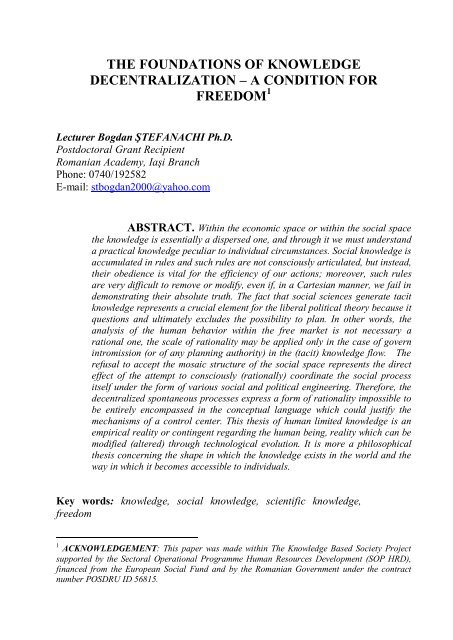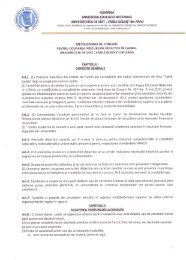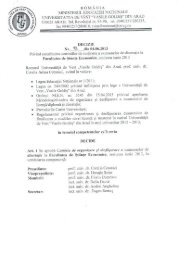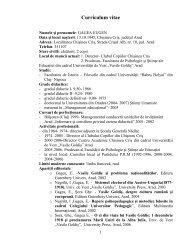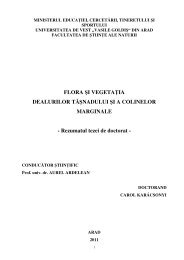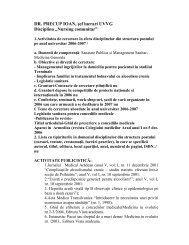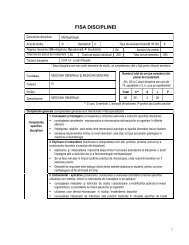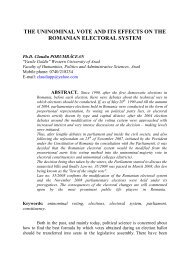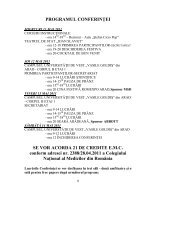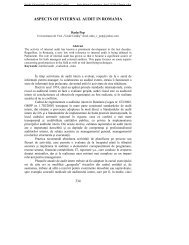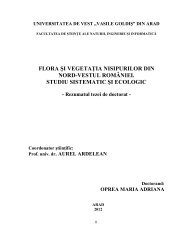Citeste articolul
Citeste articolul
Citeste articolul
- No tags were found...
Create successful ePaper yourself
Turn your PDF publications into a flip-book with our unique Google optimized e-Paper software.
Society and Politics Vol.5, No.1(9)/April 2011impossible to articulate, the individuals “will always know more than will everbe able to express.” (Gray 1984:15) Thus Hayek, as he also showed inConstitution of Liberty, will be able to extract one of the main arguments in thefavor of freedom from the human ignorance – “a free (Liberal) regime allows theuse of knowledge in an unknown manner to us today (and ever): any centralizedregime which relies only on explicit knowledge will explore only a small part ofthe available knowledge – that tiny part expressible in different reasoning andsentences.” (Gary 1984;15) Only such a type of regime allows the use of the totalamount of knowledge available in society and, throughout it, it becomes the onlyone capable to offer the necessary premises to set-up freedom.Generally, “knowledge exists only in the form of individual knowledge.It’s not more than a metaphor to speak about society knowledge as a whole. Thesum of all individuals’ knowledge does not exist anywhere as a whole.” (Hayek1960: 24-25) Therefore, economic knowledge (as part of social knowledge) willnever be able to exist as an organized coherent corpus, but only as an incompleteand dispersed form among all the members of a society. According to this view,the economic knowledge can’t be concentrated at the level of one intellect (orinstitution) and this makes any attempt to centralize it impossible and absurd.This thesis of limited human knowledge is not an empirical or contingentreality concerning human nature, reality which can be modified (altered) bytheological evolution. It is more “a philosophical thesis concerning the form inwhich knowledge exists in the world and the way in which it becomes availableto individuals.” (Barry 1979: 10)In this epistemological context, if an economy whishes to be successful ithas to be able to handle knowledge division and fragmentation; featuresparticular to contemporary societies. The issue the social space confronts withrefers not only to: “ the modality of «given» resources allocation – if «given»refers to the meaning given by each individual who, deliberately, offers ananswer to the issues caused by this set of «given» resources. It is more an issue ofthe modality in which we can ensure the best use of the resources known by allthe members of the society in order to reach goals of which relative importance isknown only by these individuals. Or, in short, it is an issue of knowledge usewhich is not entirely given to someone.” (Hayek 1952: 77-78)The modern correspondent of the invisible hand of Adam Smith isdiscovered by Hayek under the form of spontaneous order, which in theeconomic field is expressed in the form of catallaxy, which is “the order inducedby the mutual adjustments between different particular economies. Catallaxy isthus a special type of spontaneous order, produced by the market throughoutindividuals who act obeying the laws of property, civil laws and agreements”.“The confusion made due to the ambiguity of the economic termis so profound that it becomes necessary to limit its utilization to its37
Bogdan Ştefanachi - The Foundations of Knowledge Decentralization – A Condition forFreedomoriginal meaning of describing a complex of actions deliberatelycoordinated, serving a single set of goals and to adopt another term todescribe the numerous interrelationed economies system whichconstitutes the market order. As the name of «catallactics» has been longbefore suggested for the science concerning the market order, and hasrecently been revitalized, it is normal to adopt a corresponding term forthe market order itself. The term «catallactics» derivates from theKatallatein (or Katallasein) Greek verse which, significantly, means notonly «to change» but also «to accept within community» and «to changefrom enemy into friend». Thus, the adjective «catallactic» derived inorder to substitute «economic» describing the type of phenomena thecatallactics science refers to. Ancient Greeks didn’t know this term northe corresponding substantive; but, if there existed one back then, itwould have been katallaxia. From this we can form the English termcatallaxy which we will use to describe the order which flows from themutual adjustments of individual economies within the market. (A)Catallaxy is therefore, that special type of spontaneous order producedby the market throughout individuals who act within the norms ofproperty law, of civil law and agreement. ” (Hayek 1976: 108-109)The term economy cannot and must not be used because it implies thehierarchy and design, being moreover specific to the type of internal organizationof economical actors. Therefore, the “confusion between «catallaxy» and«economy» ultimately derives from the inability to understand that the orderwhich is the outcome of the conscious coordination – the order of the managerialhierarchy within a corporation – is depends itself on a more comprehensivespontaneous. The claim that the realm of human exchanges (the economy) is thesubject of planification, is basically the claim to rebuilt the social life after thepattern of a factory, of an army or of a corporation or, in other words, after thepattern of an authoritarian organization.” (Gray 1984: 35-36)In a similar manner with the market economy of Adam Smith, Hayek’scatallaxy produces the collective welfare by following and accomplishingindividual goals; similarly to Smith, Hayek argues that no mechanism – besidesthe market laissez-faire system – created by the society can accomplish, moreimpartially and efficiently, this goal. The impartiality of catallaxy is of afundamental importance for Friedrich A. Hayek as the product of the marketorder offers a fair allocations of resources, as the objectives of the market can’tbe ranked or planned: “the task of every economic activity is to reconcile thecompeting objectives deciding for which of them to be allocated the limitedexisting resources. The market order reconciles the demand of various noneconomicobjectives using the only process from which everyone benefits from –yet, without ensuring that the most important demands will represent priorities in38
Society and Politics Vol.5, No.1(9)/April 2011regard with the less important due to the fact that within such a system therecannot exist only a single order for needs.” (Hayek 1976: 113) Thus, the marketoffers the best solution for the economic issues of the society, because only thistype of spontaneous order can provide information on the manner in which “itcan be ensured the best use of resources available to the members of society, toaccomplish objectives of which relative importance is known only by theseindividuals.” (Hayek 1952: 80)Within the free market, unlike planned (command) economies (economicplan being itself absurdity) information, knowledge is directly transmitted andcoordinated using the price mechanisms in an unbounded competition process.So, the fundamental epistemic function of the market is captured by Hayek whenhe considers competition as “the procedure used to discover such acts (realities)which, otherwise could not be known or used.” (Hayek 1978:191) Therefore,this type of knowledge is “locally and temporally fragmented”. Moreover, asalready demonstrated, the knowledge which balances the economic spaceallowing the cohabitation of various personal levels, is not a theoreticalknowledge but a practical one, impossible to centralize; is a knowledge “ofindividuals, of (real) local conditions and of (distinct) particular circumstances”.Thus, the knowledge division, fragmentation issue becomes “the core issue of theeconomy as social science.” (Hayek 1952: 50)ConclusionsThe refusal to accept the mosaic structure of knowledge particular to thesocial space represents the direct effect of the attempt to consciously (rationally)coordinate the social process itself under the form of different social and politicalengineering culminating under the form of what Saint-Simon named “ scientificSocialism”. What the social (political) engineer lacks is, first, the total control ofthe information, which he should manage and, second, placing himself within a(scientific) theoretical diagram he refuses that particular type of knowledge aboutwhich Hayek says that “is almost entirely a type of knowledge of the particularcircumstances of time and space or, maybe, a technique to discover thesecircumstances in a given environment.” (Hayek 1995: 174-175) Therefore, theplace of the (social or political) engineer is taken, both in Hayek’s and the entireNew Right Liberal tradition’ cases, by the entrepreneur and the institution ofentrepreneurship.The impossibility to plan derives from the impossibility to centralize tacitknowledge, from the fact that human actions are ultimately governed byunconsciously obeyed and impossible to verbally define rules – “ as long asindividuals act according to rules it is not necessary for them to be aware of theserules. It is enough for them to know how to act according to the rules, withoutknowing that the rules, in articulated terms, are so and so.” (Hayek 1973: 99)39
Bogdan Ştefanachi - The Foundations of Knowledge Decentralization – A Condition forFreedomThese rules of the tacit knowledge allow the individual to be able toadapt an environment of which complexity goes beyond the rational humancapacity of understanding and formalization. Consequently, “following suchrules individuals are able to use a huge amount of knowledge which wouldotherwise be inaccessible to them under the shape of individual manner”(Petsoulas 2001: 23) (these rules comprise the accumulated and transmittedexperience from one generation to the other while organizations – the constructedorder – are exclusively limited to the knowledge which can be consciouslycontrolled).Bibliography1. Barry, N.P. The New Right. London: Croom Helm, 1987.2. Barry, N. P. Hayek’s Social and Economic Philosophy. London: MacMillanPress, 1979.3. Friedman, M. Capitalism and Freedom. Chicago & London: University ofChicago Press, 1962.4. Gray J. Hayek on Liberty. Oxford: Basil Blackwell, 1984.5. Hayek, F. A. Law, Legislation and Liberty. volume I: Rules and Order. Chicago:University of Chicago Press, 1973.6. Hayek, F.A. Law, Legislation and Liberty. volume II: The Mirage of socialJustice. London: Routledge and Kegan Paul, 1976.7. Hayek, F. A. Constitution of Liberty. London: Routledge and Kegan Paul, 1960.8. Hayek, F. A. Individualism and Economic Order. London: Routledge and KeganPaul, 1952.9. Hayek, F. A. New Studies in Philosophy, Politics, Economics and the History ofIdeas. London: Routledge and Kegan Paul, 1978.10. Hayek, F. A. The Counter-Revolution of Science, The Free Press of Glencoe.London: Collier – Macmillan, 1995.11. Oakeshott, M. Raţionalismul în politică. Bucureşti: Editura All, 1995.12. Petsoulas, C. Hayek’s Liberalism and Its Origins. His Idea on SpontaneousOrder and the Scottish Enlightenment. London: Routledge, 2001.13. Polanyi, M. The Study of Man. Chicago: University of Chicago Press, 1959.14. Ryle, G., Collected Papers. volume 2, London: Hutchinson of London, 1971.40


